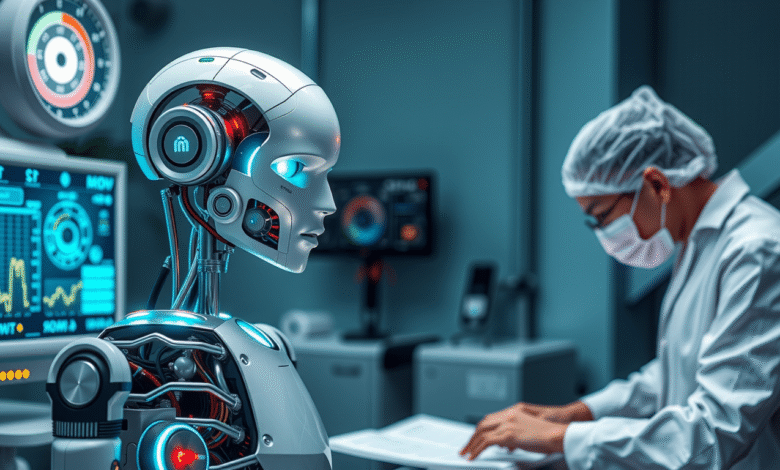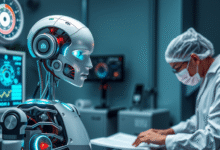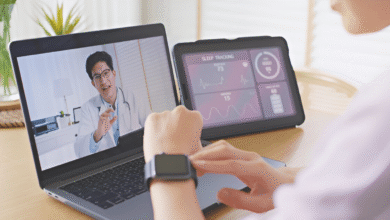Top 20 Benefits of AI in the Healthcare Industry
Discover 20 transformative benefits of artificial intelligence in healthcare. From improved diagnostics to personalized treatment plans. Learn how AI revolutionizes patient care today.

The artificial intelligence in healthcare revolution is transforming modern medicine at an unprecedented pace. As we advance deeper into the digital age, AI healthcare benefits are becoming increasingly evident across hospitals, clinics, and medical research facilities worldwide. The integration of machine learning in medicine and sophisticated algorithms is reshaping how healthcare professionals diagnose diseases, treat patients, and manage medical operations.
Healthcare AI applications span from diagnostic imaging and drug discovery to robotic surgery and personalized medicine. This technological evolution addresses critical challenges that have long plagued the healthcare industry, including rising costs, physician shortages, diagnostic errors, and the growing demand for quality patient care. The global healthcare AI market is projected to reach unprecedented heights, with industry experts predicting exponential growth as medical institutions increasingly adopt these innovative solutions.
The impact of AI in medical diagnosis extends far beyond simple automation. These intelligent systems can process vast amounts of medical data, identify patterns invisible to human eyes, and provide insights that enhance clinical decision-making. From early disease detection to treatment optimization, artificial intelligence is proving to be an invaluable ally for healthcare professionals seeking to improve patient outcomes while reducing operational costs.
Digital health innovations powered by AI are not just futuristic concepts but present-day realities transforming patient experiences. Smart hospitals equipped with AI-driven systems can predict patient deterioration, optimize resource allocation, and streamline administrative processes. Meanwhile, healthcare automation reduces human error and frees medical professionals to focus on direct patient care rather than repetitive tasks.
The twenty benefits outlined in this comprehensive analysis demonstrate how artificial intelligence in healthcare is creating a paradigm shift toward more efficient, accurate, and personalized medical care. Each benefit represents a significant advancement in addressing traditional healthcare challenges while opening new possibilities for medical innovation and improved patient outcomes.
1. Enhanced Diagnostic Accuracy
AI in medical diagnosis significantly improves diagnostic precision by analyzing medical images, laboratory results, and patient symptoms with remarkable accuracy. Machine learning algorithms can detect subtle patterns in radiological images that might escape human observation, particularly in early-stage cancer detection, cardiovascular disease identification, and neurological disorder diagnosis.
Advanced diagnostic AI systems process thousands of medical cases to develop sophisticated pattern recognition capabilities. These systems can identify diabetic retinopathy in eye scans, detect skin cancer from photographs, and analyze cardiac rhythms to predict heart conditions. The technology reduces false positives and negatives, leading to more reliable diagnoses and appropriate treatment plans.
Healthcare AI applications in diagnostics also extend to pathology, where AI algorithms analyze tissue samples and blood work with extraordinary precision. This enhanced accuracy translates to earlier disease detection, improved treatment outcomes, and reduced healthcare costs associated with misdiagnosis and delayed intervention.
2. Accelerated Drug Discovery and Development
Machine learning in medicine revolutionizes pharmaceutical research by dramatically reducing drug discovery timelines from decades to years. AI algorithms analyze molecular structures, predict drug interactions, and identify promising therapeutic compounds with unprecedented efficiency.
Healthcare automation in drug development processes vast databases of chemical compounds, clinical trial data, and genomic information to identify potential treatments. This acceleration is particularly crucial for rare diseases and urgent health crises, where traditional drug development timelines prove inadequate.
AI-powered drug discovery platforms can simulate millions of molecular interactions, predict drug efficacy, and identify potential side effects before human trials begin. This capability significantly reduces research costs while improving the probability of successful drug development and regulatory approval.
3. Personalized Treatment Plans
Digital health innovations enable highly personalized treatment approaches by analyzing individual patient data, genetic information, and medical history. AI systems create tailored treatment recommendations that consider unique patient characteristics, medication responses, and lifestyle factors.
Precision medicine AI processes genomic data to identify genetic markers that influence drug metabolism and treatment effectiveness. This personalization ensures patients receive optimal medication dosages and treatment protocols based on their specific biological makeup and medical profile.
Healthcare AI applications in personalized medicine extend to cancer treatment, where AI analyzes tumor genetics to recommend targeted therapies. This approach improves treatment outcomes while minimizing adverse effects and unnecessary interventions.
4. Predictive Analytics for Disease Prevention
AI healthcare benefits include sophisticated predictive modeling that identifies patients at risk of developing specific conditions before symptoms appear. These predictive analytics examine patient data patterns to forecast potential health issues and recommend preventive interventions.
Machine learning algorithms analyze electronic health records, lifestyle data, and genetic information to predict cardiovascular events, diabetes onset, and infectious disease outbreaks. This predictive capability enables proactive healthcare management and population health initiatives.
Healthcare automation through predictive analytics helps hospitals prepare for patient influxes, allocate resources efficiently, and implement targeted prevention programs. This proactive approach reduces healthcare costs and improves overall population health outcomes.
5. Robotic Surgery Precision
Surgical AI systems enhance surgical precision through robotic assistance and real-time guidance. AI-powered surgical robots provide steady, precise movements that surpass human capabilities, particularly in minimally invasive procedures requiring extreme accuracy.
Healthcare AI applications in surgery include image-guided navigation, automated suturing, and real-time tissue analysis. These systems reduce surgical complications, minimize recovery times, and improve surgical outcomes across various medical specialties.
Digital health innovations in robotic surgery also enable remote procedures, where expert surgeons can operate on patients in distant locations using AI-enhanced robotic systems. This capability expands access to specialized surgical care in underserved regions.
6. Streamlined Administrative Processes
Healthcare automation significantly improves administrative efficiency by automating appointment scheduling, insurance verification, billing processes, and medical documentation. AI systems reduce administrative burdens on healthcare staff while minimizing errors in paperwork and billing.
AI healthcare benefits in administration include automated medical coding, claims processing, and patient registration systems. These improvements reduce operational costs and allow healthcare professionals to dedicate more time to direct patient care activities.
Digital health innovations in administrative processes also enhance patient experience through streamlined check-in procedures, automated appointment reminders, and efficient insurance processing systems that reduce wait times and administrative delays.
7. Real-time Patient Monitoring
IoT healthcare devices integrated with AI provide continuous patient monitoring capabilities that track vital signs, medication adherence, and health indicators in real-time. These systems alert healthcare providers to concerning changes in patient conditions.
AI in patient monitoring processes data from wearable devices, sensors, and smart medical equipment to identify trends and anomalies in patient health metrics. This continuous monitoring enables early intervention and prevents medical emergencies.
Healthcare AI applications in monitoring extend to post-surgical care, chronic disease management, and elderly care, where continuous oversight ensures patient safety and optimal recovery outcomes. The technology reduces hospital readmissions and improves quality of life for patients with ongoing health needs.
8. Medical Imaging Enhancement
AI-powered medical imaging transforms radiology by improving image quality, reducing scan times, and enhancing diagnostic capabilities. Machine learning algorithms can reconstruct high-quality images from lower radiation doses, improving patient safety.
Diagnostic AI systems analyze CT scans, MRIs, X-rays, and ultrasounds to identify abnormalities, measure anatomical structures, and track disease progression. This enhanced imaging capability supports more accurate diagnoses and treatment monitoring.
Healthcare AI applications in imaging also include automated image annotation, measurement tools, and comparison capabilities that streamline radiologist workflows and improve diagnostic consistency across medical facilities.
9. Virtual Health Assistants
AI-powered virtual assistants provide 24/7 patient support, symptom assessment, and health guidance through chatbots and voice interfaces. These systems offer immediate responses to patient inquiries and basic health concerns.
Digital health innovations in virtual assistance include medication reminders, appointment scheduling, and health education delivery. These AI systems improve patient engagement while reducing administrative workload on healthcare staff.
Healthcare automation through virtual assistants also supports chronic disease management by providing ongoing guidance, tracking health metrics, and alerting patients to necessary medical attention or lifestyle modifications.
10. Epidemic and Pandemic Tracking
AI healthcare benefits include sophisticated disease surveillance systems that track infectious disease patterns, predict outbreak locations, and model transmission scenarios. These capabilities proved invaluable during recent global health crises.
Machine learning in medicine analyzes population health data, travel patterns, and environmental factors to identify emerging health threats and recommend containment strategies. This early warning capability enables rapid public health responses.
Healthcare AI applications in epidemic tracking also support vaccine distribution planning, resource allocation, and policy development by providing data-driven insights into disease transmission patterns and population vulnerability factors.
11. Optimized Resource Allocation
Healthcare automation improves hospital efficiency by optimizing staff scheduling, equipment utilization, and bed management. AI systems analyze patient flow patterns, treatment requirements, and resource availability to maximize operational efficiency.
AI healthcare benefits in resource optimization include inventory management systems that track medical supplies, predict usage patterns, and automate ordering processes. This optimization reduces waste and ensures critical supplies remain available.
Digital health innovations in resource allocation also extend to energy management, maintenance scheduling, and facility utilization optimization, contributing to overall healthcare system efficiency and cost reduction.
12. Mental Health Support
AI mental health applications provide accessible psychological support through automated therapy sessions, mood tracking, and crisis intervention systems. These tools expand mental health care access to underserved populations.
Digital health innovations in mental health include sentiment analysis of patient communications, predictive modeling for depression and anxiety, and personalized therapeutic interventions based on individual patient needs and responses.
Healthcare AI applications in psychiatry also support clinicians by analyzing patient behavior patterns, medication responses, and therapy outcomes to optimize treatment protocols and improve mental health care delivery.
13. Reduced Medical Errors
AI healthcare benefits significantly reduce medical errors through automated medication checking, dosage calculations, and allergy alerts. These systems prevent adverse drug events and improve patient safety across healthcare settings.
Healthcare automation includes clinical decision support systems that flag potential errors, suggest alternative treatments, and provide evidence-based recommendations. This error reduction capability saves lives and reduces malpractice liability.
Machine learning in medicine continuously learns from medical data to identify error patterns and implement preventive measures. This ongoing improvement cycle enhances overall healthcare quality and patient safety standards.
14. Accelerated Clinical Trials
AI in clinical research streamlines patient recruitment, data analysis, and trial management processes. Machine learning algorithms identify suitable trial participants and predict trial outcomes with greater accuracy.
Healthcare AI applications in clinical trials include automated data collection, adverse event monitoring, and statistical analysis capabilities that accelerate research timelines and improve trial success rates.
Digital health innovations in clinical research also enable virtual trials, remote monitoring, and decentralized study management, expanding trial participation and reducing research costs while maintaining scientific rigor.
15. Telemedicine Enhancement
AI-powered telemedicine platforms improve remote healthcare delivery through intelligent triage systems, automated symptom assessment, and enhanced communication capabilities between patients and providers.
Digital health innovations in telemedicine include real-time language translation, visual diagnostic assistance, and remote monitoring integration that expand healthcare access to rural and underserved communities.
Healthcare automation in telehealth also includes appointment optimization, patient preparation guidance, and follow-up care coordination that improve the effectiveness and efficiency of remote medical consultations.
16. Genomic Analysis Advancement
AI in genomics accelerates genetic analysis by processing vast genomic datasets to identify disease-associated genetic variants, predict genetic risks, and guide personalized treatment decisions.
Machine learning in medicine enables rapid genome sequencing analysis, variant interpretation, and therapeutic target identification. This capability advances precision medicine and genetic counseling services.
Healthcare AI applications in genomics also support rare disease diagnosis, cancer genomics, and pharmacogenomics research that improves understanding of genetic factors in health and disease.
17. Supply Chain Optimization
Healthcare automation improves medical supply chain management through demand forecasting, inventory optimization, and automated procurement systems that ensure critical supplies remain available when needed.
AI healthcare benefits in supply chain include cold chain monitoring for vaccines and medications, expiration date tracking, and supplier performance analysis that reduce waste and improve product quality.
Digital health innovations in supply chain management also include blockchain integration for medication authenticity verification and supply chain transparency that enhance patient safety and regulatory compliance.
18. Enhanced Patient Experience
AI patient experience improvements include personalized communication, automated appointment scheduling, and intelligent routing systems that reduce wait times and improve satisfaction scores.
Healthcare AI applications in patient experience include voice-activated room controls, automated discharge planning, and personalized health education delivery that enhance comfort and engagement during healthcare encounters.
Digital health innovations in patient experience also extend to mobile health applications, patient portals, and communication platforms that improve accessibility and convenience of healthcare services.
19. Medical Education and Training
AI in medical education transforms healthcare training through virtual reality simulations, personalized learning paths, and automated assessment systems that improve educational outcomes and clinical competency.
Healthcare automation in medical training includes surgical simulators, diagnostic training programs, and continuing education platforms that enhance skills development and knowledge retention among healthcare professionals.
Digital health innovations in medical education also support remote learning, competency tracking, and performance analytics that improve training efficiency and effectiveness across healthcare disciplines.
20. Cost Reduction and Efficiency
AI healthcare benefits culminate in significant cost reductions through improved efficiency, reduced errors, optimized resource utilization, and enhanced productivity across healthcare operations and patient care delivery.
Healthcare automation reduces labor costs, minimizes waste, and improves operational efficiency while maintaining or improving care quality. These cost benefits make healthcare more accessible and sustainable.
Machine learning in medicine continuously optimizes healthcare processes, identifies cost-saving opportunities, and improves financial performance while supporting better patient outcomes and provider satisfaction.
Conclusion
The twenty benefits of artificial intelligence in healthcare outlined above demonstrate the transformative potential of AI technologies in modern medicine. From enhanced diagnostic accuracy to cost reduction, these AI healthcare benefits address fundamental challenges while opening new possibilities for medical innovation and improved patient care.
As healthcare AI applications continue to evolve, the integration of artificial intelligence will become increasingly essential for healthcare organizations seeking to deliver high-quality, efficient, and personalized care. The future of healthcare lies in the seamless collaboration between human expertise and artificial intelligence capabilities.
The ongoing development of digital health innovations promises even greater advances in medical care, research, and health outcomes. Healthcare organizations that embrace these technologies today will be better positioned to serve their communities and advance the practice of medicine in the years ahead.











